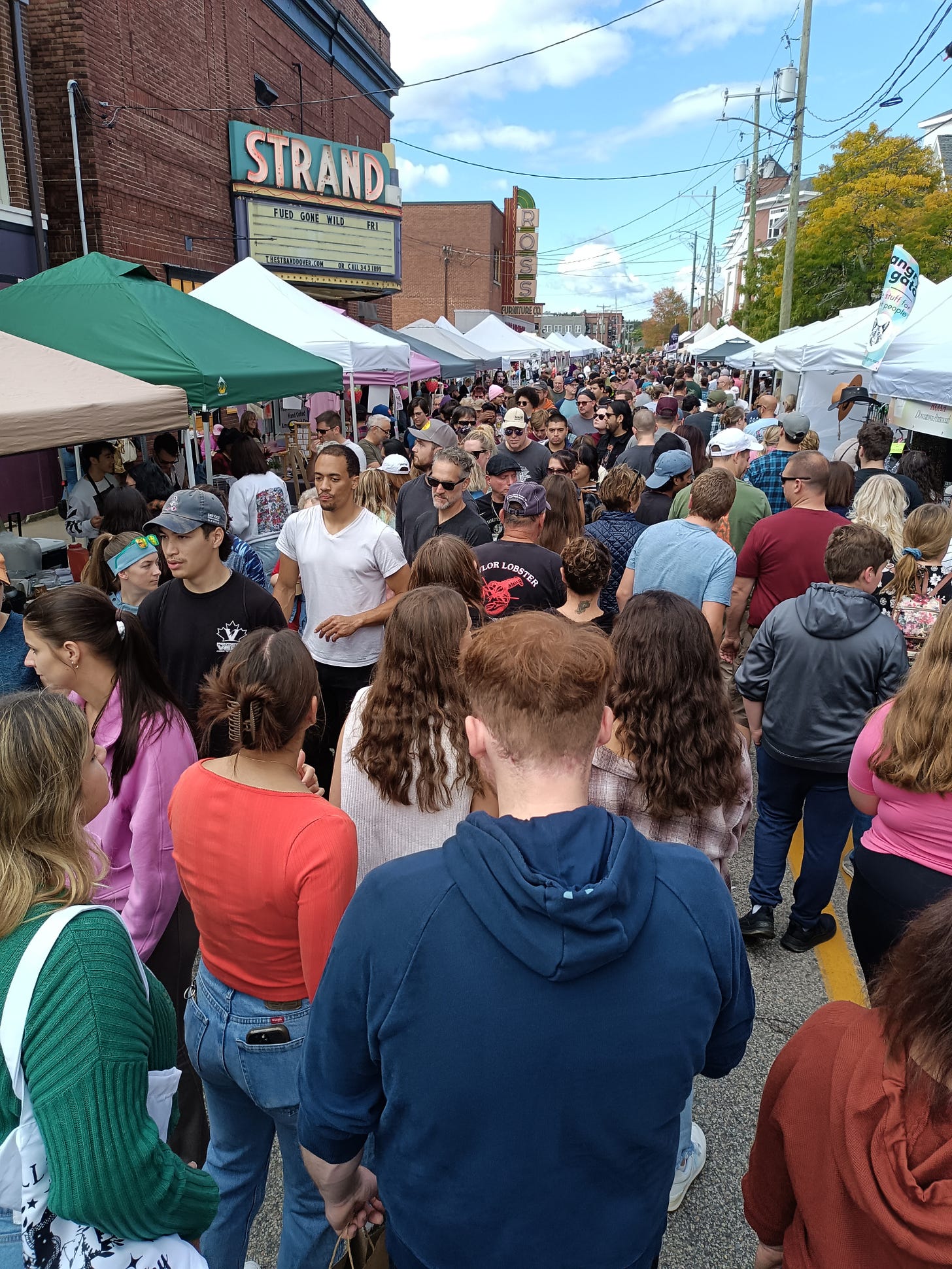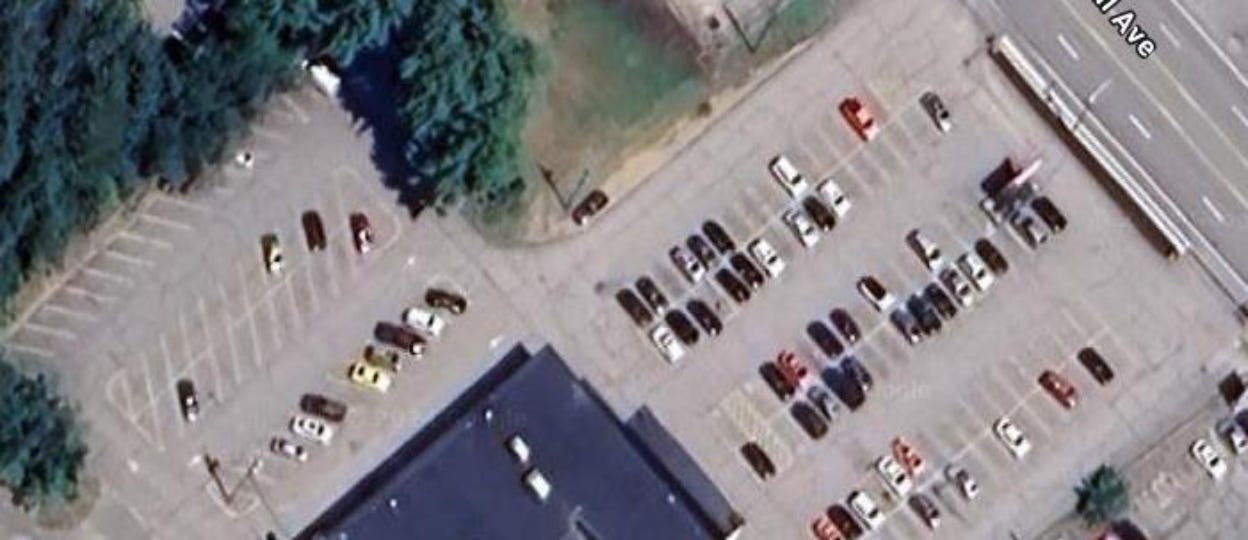This weekend was Apple Harvest Day in Dover and it was my first time attending even though I’ve lived in Dover for nearly 2 years. It was a fun event and I really enjoyed the atmosphere and seeing Central Avenue taken over my market stalls and people. It reminded me of Taiwan’s night markets which close down local streets every night to put on a similar, smaller event, just with a lot more food-focused vendors. Most of the area that the festival was located in is normally reserved 24/7 for vehicle transportation, but an event like Apple Harvest Day can really show off the benefits of viewing our streets as places to be, not just paths to take.
I recently met an attendee, Eric Leaver, at one of my Strong Towns meetings who doesn’t own a car and gets around using bike, transit, and Uber when the need arises. He describes it as a “car-lite” lifestyle since he does occasionally use someone else’s car and he has been doing it for years. He and I took a bike ride together and I asked him if we would be interested in talking more about the benefits and challenges of not owning a car in this area and he was kind enough to do so and today’s article was written by him. Before we get to that, though, let’s look at our planned meetings for October.
This month we are regrouping to gather and plan our next community event. We are still at the Dover Library currently, but are aware that they will be closing starting in December, so expect our usual meeting spot to change in the future months.
October 2024 Meetings
Saturday Meeting Details
Saturday, October 19th 10:30AM - 12:00PM
Dover Public Library Learning Center
We had good success with our most recent community project focused on Henry Law Park, so I thought that we could revisit our project list and come up with a new plan to take on a community project
Monday Meeting Details
Monday, October 28th 6:30PM - 8:00PM
Juniper Kitchen in Dover
The meeting will be on the 28th, but I wanted to wait on choosing a topic because the owner of Juniper Kitchen has asked to meet with me this Wednesday to discuss some ideas. I wanted to have that meeting to see if she has ideas for Monday meetings at her store and I will share the full details of plans for the Monday meeting in our next newsletter that should come out near Monday 21st.
Cars, Bodies, & Dover
by Eric Leaver
I want to talk about my lifestyle. Not the lifestyle; stop it. A lifestyle. One that fights your inherent desire for convenience, yet potentially pays you back in spades. A car-lite lifestyle.
This lifestyle carries some unfortunate stigma. As a teenager, I wanted nothing more than a set of wheels to go where I wanted, when I wanted, to carry a bunch of stuff shielded from theft and weather, and to hang out with friends listening to a loud stereo. Once I had that car, I then came to pity those who didn’t. Indeed, I loved my car.
But do Americans love their bodies? Billionaire businessman Warren Buffet said the following (lightly edited) to a group of young Americans regarding cars and bodies:
I’m going to let each one of you pick out the car of your choice. Sounds good, doesn’t it? Pick it out—any color—you name it. It’ll be tied up with a bow, and it’ll be at your house tomorrow. “Well, what’s the catch?” The catch is: it’s the only car you’re going to get in your lifetime.
Now, what are you going to do… knowing that’s the only car you’re ever going to have—and you love that car? You’re going to take care of it like you cannot believe.
Now the truth is, you’re not just going to get one car in your lifetime. But you are going to get only one body… and one mind. And that’s all you’re going to get. That body and mind feels terrific now, but they have to last you a lifetime.
Some people come to the car-lite lifestyle out of necessity (eg, disability or disenfranchisement). But more commonly, people seek benefits such as frugality, reduced environmental impact, and as Mr Buffet emphasized—fitness. Body fitness is perhaps obvious, since you’re doing a lot of walking and perhaps bicycling. Though negotiating any transit system is a sweaty workout for your mind as well.
Of course, fitness goals can be addressed directly. But rather than addressing them by adding things to your life (eg, the gym), the car-lite lifestyle integrates these goals into what you’re already doing. Reducing your car usage then becomes a challenge that you solve both mentally and physically.
This comes at the price of convenience, yes. But no one said taking care of your body would be easy. Indeed, easy is the enemy of fitness.
How much convenience you give up depends, in part, on your town. For example, my gym in Dover has a large parking lot to accommodate all the people that drive to it. That is, people are literally driving to the gym to pedal on a stationary bicycle that goes nowhere. It seems absurd until you see the 5-lane NH 9/108 stroad with no bike lane that you’d have to negotiate to get there otherwise. To their credit, Planet Fitness does provide bicycle parking for those brave enough to choose that option.
Transit is another option, with two bus lines stopping 0.3 miles away and accessible by sidewalk. But as of Oct-2024, the buses only run once per hour. So there’s significant risk that hitting the gym could take much longer than you had planned. Maybe that’s mental fitness—to get the timing just right?
Lack of funding for more frequent transit aside, curious additional gaps exist as well. Like the fact that these two bus lines each use their own separate mobile app for realtime arrival data (c’mon people). Or the third bus line that passes right in front of the gym, but who’s sparse coverage of the stroad leaves its closest stops at 0.5-0.7 miles away.
The unfortunate truth of a car-lite lifestyle is that it means leaning into the walking/biking/transit infrastructure of your town, which may or may not exist in a satisfactory state. But all stroads are eventually repaved, and transit lines are eventually reorganized. Those of us living a car-lite lifestyle or those seeking to do so should make themselves ready for these opportunities to make our town stronger and oppose the status quo. Our bodies deserve better.
Conclusion
I’d like to thank Eric for writing an article for the newsletter. It makes me think about my own activity and I wonder how many (or how few) steps I am taking per day. I’ve mentioned in the past about the differences between streets and roads and how the stroad combines them into an unsafe pattern that is hostile to people outside of a vehicle, but Eric does a great job of describing how inconvenient this design really is for people who live or want to live car-lite. If we can make more of our streets safe and inviting, then I think we can mitigate some of that inconvenience and get more people into active modes of transportation. There is a video from the YouTuber Not Just Bikes that also talks about this subject if you are interested in learning more.










Really fascinating read! I just moved to Dover after 7 years in the Boston area where walking is the status quo, and continue to rely primarily on walking in Dover by choice. The physical and mental benefits are unbeatable!